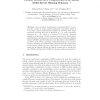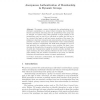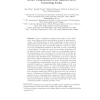27 search results - page 4 / 6 » Causality-based Abstraction of Multiplicity in Security Prot... |
104
Voted
CCR
2004
14 years 11 months ago
2004
Abstract-- This paper describes a system for automated generation of attack signatures for network intrusion detection systems. Our system applies pattern-matching techniques and p...
ASIACRYPT
2005
Springer
15 years 5 months ago
2005
Springer
Abstract. As an extension of multi-party computation (MPC), we propose the concept of secure parallel multi-party computation which is to securely compute multi-functions against a...
101
click to vote
ESORICS
2008
Springer
15 years 1 months ago
2008
Springer
Abstract. Identity fraud (IDF) may be defined as unauthorized exploitation of credential information through the use of false identity. We propose CROO, a universal (i.e. generic) ...
FC
1999
Springer
15 years 3 months ago
1999
Springer
Abstract. We present a series of protocols for authenticating an individual’s membership in a group without revealing that individual’s identity and without restricting how the...
112
click to vote
EUROCRYPT
2007
Springer
15 years 5 months ago
2007
Springer
Abstract. Secure computation consists of protocols for secure arithmetic: secret values are added and multiplied securely by networked processors. The striking feature of secure co...



